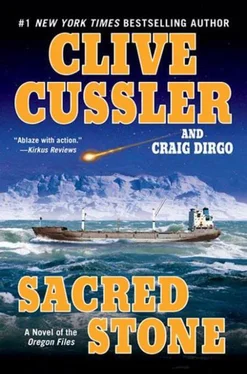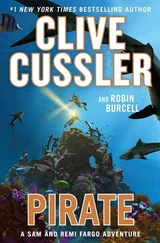Clive Cussler - Sacred Stone
Здесь есть возможность читать онлайн «Clive Cussler - Sacred Stone» весь текст электронной книги совершенно бесплатно (целиком полную версию без сокращений). В некоторых случаях можно слушать аудио, скачать через торрент в формате fb2 и присутствует краткое содержание. Жанр: Морские приключения, на английском языке. Описание произведения, (предисловие) а так же отзывы посетителей доступны на портале библиотеки ЛибКат.
- Название:Sacred Stone
- Автор:
- Жанр:
- Год:неизвестен
- ISBN:нет данных
- Рейтинг книги:4 / 5. Голосов: 1
-
Избранное:Добавить в избранное
- Отзывы:
-
Ваша оценка:
- 80
- 1
- 2
- 3
- 4
- 5
Sacred Stone: краткое содержание, описание и аннотация
Предлагаем к чтению аннотацию, описание, краткое содержание или предисловие (зависит от того, что написал сам автор книги «Sacred Stone»). Если вы не нашли необходимую информацию о книге — напишите в комментариях, мы постараемся отыскать её.
Sacred Stone — читать онлайн бесплатно полную книгу (весь текст) целиком
Ниже представлен текст книги, разбитый по страницам. Система сохранения места последней прочитанной страницы, позволяет с удобством читать онлайн бесплатно книгу «Sacred Stone», без необходимости каждый раз заново искать на чём Вы остановились. Поставьте закладку, и сможете в любой момент перейти на страницу, на которой закончили чтение.
Интервал:
Закладка:
From what he could see the walls were round and smooth. The floor of the chamber was fitted with flat rocks to form an almost perfectly level floor. Geodes and crystals hung from the ceiling like chandeliers. Ackerman reached down and adjusted his flashlight. Then he stood up, raised the light over his head and gasped in awe.
Flowing up from the center of the room was a platform where a gray orb sat on display.
The geodes and crystals hanging from the ceiling scattered light from the flashlight into thousands of rainbows that spilled around the room like a spinning disco ball. Ackerman exhaled and the sound was magnified.
Stepping up to the chest-high platform, he stared at the orb.
“Meteorite,” he said aloud.
Then he removed the digital camera and began to document the scene.
After climbing back down the ladder, he retrieved a Geiger counter and a book on metal analysis and tried to determine the orb’s composition. He soon figured it out.
AN HOUR LATER, back down from the upper cave, Ackerman assembled the digital images and readings from the Geiger counter into an e-mail package. After spending another hour composing a glowing press release about himself and including that in the message, he sent the e-mail to his benefactor for approval.
Then he sat back to bask in his glory and await a reply.
AT THE ECHELON monitoring station outside London near Chatham, most of the world’s communications were recorded. A joint English–United States operation, Echelon had received a fair share of scrutiny from the press on both sides of the pond. Quite simply Echelon was nothing more or less than a massive eavesdropping apparatus that snagged worldwide communications and ran them through a computer for review. Certain words were flagged so that if they appeared, it triggered the message to be spit out for review by a human. Then the flagged message passed up a chain of command until it was forwarded to the proper intelligence service or ignored as unimportant.
Ackerman’s e-mail from Greenland passed up to a satellite before being relayed back to the United States. On its way back to earth, Echelon snagged the message and ran it through its computer. There was a word in the message that triggered a review.
In time the message would pass along the chain of command from England across the ocean on a secure line to the National Security Agency in Maryland, then on to the Central Intelligence Agency in Langley, Virginia.
But there was a traitor inside Echelon, so the review went to more than one location.
Inside the cave on Mount Forel, John Ackerman was living a fantasy life in his mind. He’d already pictured himself on the covers of most of the archaeology magazines; now he was formulating an acceptance speech for what, in his mind at least, was something akin to the Academy Awards of archaeology.
This find was huge, like the modern-day opening of a pyramid, like finding an untouched, perfectly preserved shipwreck. Magazine articles, books, television shows loomed. If Ackerman played his cards right, he could ride this find into a lifelong career. He could become the acknowledged grandmaster of archaeology, the man the media always called for comment. He could become a celebrity—and nowadays that was a career in and of itself. With just a little manipulation, the name John Ackerman would be synonymous with great discovery.
Then his computer chirped to report an incoming message.
The message was succinct.
Don’t tell anyone yet. We need more proof before the announcement. I’m sending a man up there to check it out. He will arrive in a day or two. Just continue documenting the find. Super work, John. But mum’s the word.
At first reading Ackerman was irritated by the message. Then he reflected and was able to convince himself that his benefactor was probably taking the time to build a media storm for the find. Maybe he was planning to give one of the major networks an exclusive and needed time to set up the interview. Maybe he was planning a simultaneous blitz of magazines, newspapers and television.
Soon Ackerman was awash with these thoughts and his ego started to run wild.
The larger the shower of publicity, the greater his future fame.
For Ackerman, ego tinged with self-aggrandizing would prove a deadly combination.
4
SOMETIMES IT ISbetter to be lucky than smart. High atop a hotel in a city known for risk takers, a middle-aged man named Halifax Hickman stared at the digital pictures on the computer and smiled. Reading a separate report he had printed out a few hours before, he did a few calculations on a pad of paper then stared at the images again. Unbelievable. The solution to his problem had arrived—and it had come with a tax write-off for the donation.
It was as if he had slid a quarter in a slot machine and hit a million-dollar jackpot.
Hickman started laughing—but it was not a laugh of happiness. The laugh was evil and came from a place without joy. Tinged in revenge and shaded by hatred, it rose from a recess deep in the man’s soul.
When the laugh had subsided, he reached for the telephone and dialed.
CLAY HUGHES LIVED in the mountains north of Missoula, Montana, in a cabin he’d built himself, on a plot of land 160 acres in size that he owned free and clear. A hot spring on his property provided heat for the cabin as well as for the series of greenhouses that supplied most of his food. Solar and wind energy provided electricity. Cellular and satellite telephone communications kept him in voice contact with the rest of the world. Hughes had a bank account in Missoula with a six-figure balance, an address at a pack-and-ship office to send and receive his mail, plus three passports, four social security numbers and driver’s licenses with different names and addresses.
Hughes liked his privacy—not uncommon among assassins who enjoy keeping low profiles.
“I have some work for you,” Hickman said.
“How much?” Hughes asked, cutting to the chase.
“Maybe five days, for fifty thousand dollars. And I supply the transportation.”
“I take it someone is going to have a bad day,” Hughes said. “What else?”
“I’ll need an object delivered somewhere when it’s done,” Hickman told him.
“Does it help the cause?” Hughes asked.
“Yes.”
“Then the delivery will be free,” Hughes said magnanimously.
“My jet will be there in an hour,” Hickman said. “Dress warm.”
“I want gold,” Hughes said.
“Gold it is,” Hickman said as he disconnected.
AN HOUR LATER a Raytheon Hawker 800XP touched down at the Missoula airport. Hughes shut off the engine of his restored 1972 International Scout. Reaching into the rear, he unzipped a bag and checked his firearms once again. Satisfied all was in order, he zipped the bag closed and lifted it out onto the ground. Then he closed the rear gate, bent down and armed the explosive device that he used as a burglar alarm.
If anyone messed with his vehicle while he was gone, the Scout would explode, hiding any evidence of his ownership as well as his personal papers. Hughes was nothing if not paranoid. He hoisted the bag onto his shoulder and made his way toward the jet.
Forty-seven minutes later the jet crossed into Canada on a north-northeast course.
5
THE DAY AFTERthe e-mail from Greenland was intercepted, Langston Overholt IV was sitting in his office at CIA headquarters in Virginia, staring at a picture of the meteorite. He glanced at a report on iridium, then stared at his list of agents. As usual he was shorthanded. Reaching into a bowl on his desk, he removed a tennis ball and methodically began bouncing it against his wall and catching it when it returned. The repetition relaxed him.
Читать дальшеИнтервал:
Закладка:
Похожие книги на «Sacred Stone»
Представляем Вашему вниманию похожие книги на «Sacred Stone» списком для выбора. Мы отобрали схожую по названию и смыслу литературу в надежде предоставить читателям больше вариантов отыскать новые, интересные, ещё непрочитанные произведения.
Обсуждение, отзывы о книге «Sacred Stone» и просто собственные мнения читателей. Оставьте ваши комментарии, напишите, что Вы думаете о произведении, его смысле или главных героях. Укажите что конкретно понравилось, а что нет, и почему Вы так считаете.












